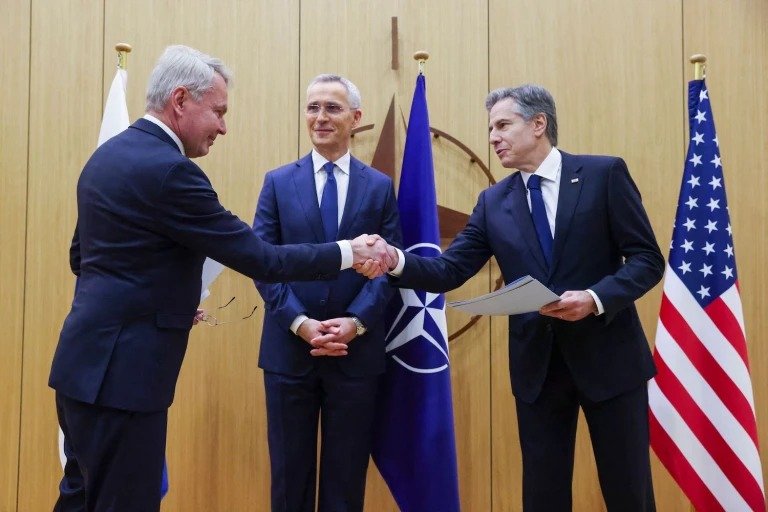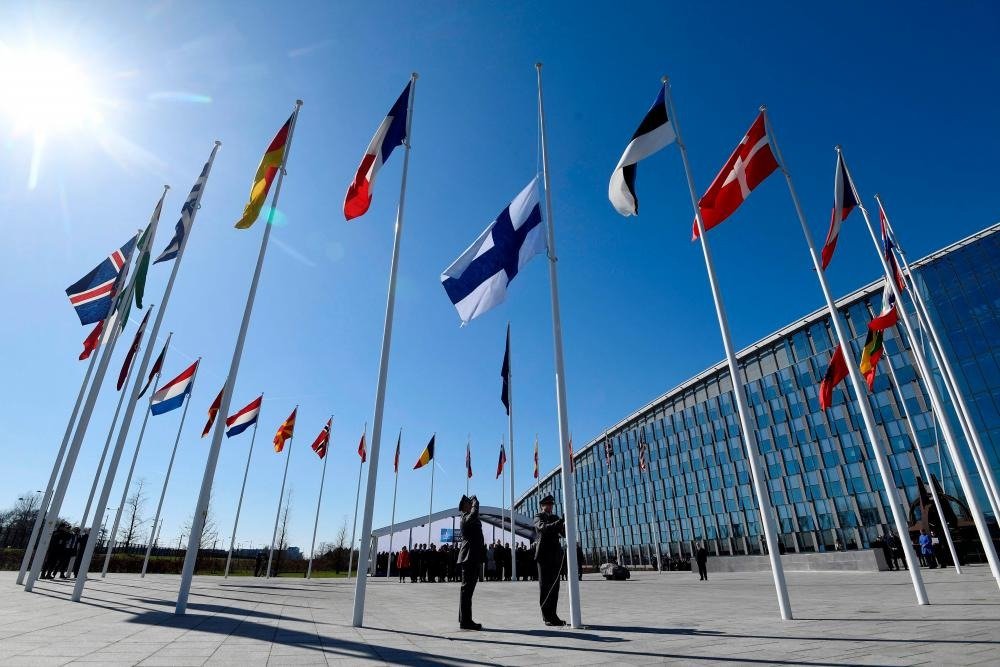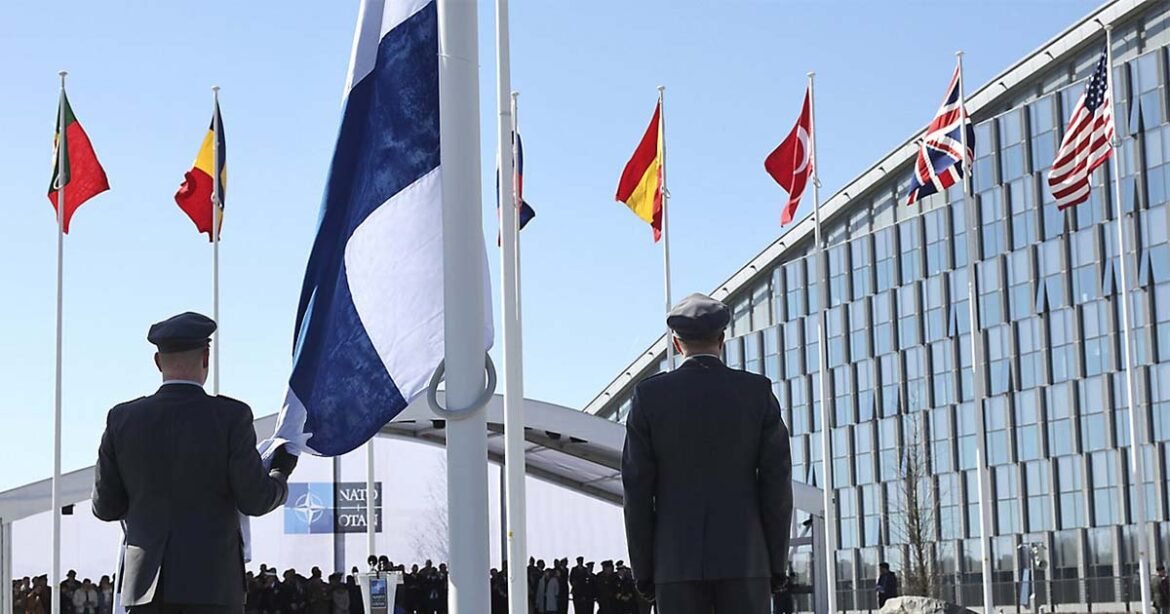Finland’s NATO accession holds significant geopolitical implications, including a strengthened border with Russia and impacts on regional security dynamics. SM Tanjil Ul Haque delves into these multifaceted implications, highlighting their potential impact on the broader geopolitical landscape.
Finland’s accession to North Atlantic Treaty Organisation (NATO) on April 4, 2023, has ignited discussions and speculation regarding the far-reaching geopolitical implications of this historic milestone. The decision holds significant importance for the defence alliance and has sparked interest in understanding the potential consequences it may have on regional security dynamics.
Strengthening NATO’s border with Russia:
Finland’s inclusion as the 31st member of NATO expands the alliance’s geographic reach and influence. One of the most notable consequences of Finland’s accession to NATO is the doubling of the defence alliance’s border with Russia. Finland shares a 1340 km (832 mile) eastern frontier with Russia, which has prompted concerns and anger within the Russian leadership.
You can also read: Türkiye faces election runoff with Erdogan on lead
Russia perceives NATO’s enlargement as a threat and views it as a potential encroachment on its sphere of influence. This has led to increased tensions between Russia and NATO, raising the stakes in the already delicate regional security environment.

The strengthening of NATO’s border with Russia through Finland’s accession has elicited varied reactions and implications. While some Russian officials express concerns about NATO’s apparent encroachment on their sphere of influence, it is to be noted that NATO views its expansion as a defensive measure aimed at ensuring the collective security of its member states. As NATO Secretary-General Jens Stoltenberg emphasised, “NATO does not seek confrontation and poses no threat to Russia.”
The increased tensions underscore the importance of maintaining open lines of communication and engaging in constructive dialogue to address concerns and prevent misunderstandings. Efforts to promote transparency, confidence-building measures, and diplomatic channels become even more critical to foster stability and reduce the potential for blunders in the region.
Russian response and increased military focus:
The Russian government has expressed its discontent and alarm over Finland’s NATO membership. Russian officials argue that their military actions in Ukraine were a response to perceived Western plans to use Ukrainian territory to instigate Russian aggression. They also claim to be fighting a hybrid war against the Western world and NATO due to the continuous support provided to Ukraine. As a result, Russia sees the need to enhance and strengthen its military capabilities to address the seeming threats from NATO. This development presents a challenging situation for Russia, as it needs to secure its extended border with Finland while responding to the evolving security landscape.
The Russian response to Finland’s NATO membership has been met with differing perspectives. Russian officials have expressed their concerns, with Deputy Foreign Minister Alexander Grushko stating, “NATO’s movement closer to our borders clearly does not contribute to security and stability in Europe.” Russia perceives NATO’s expansion as having potential implications for its security interests, leading to a sense of unease and raising the potential for regional instability.
Finland’s proximity to Russia’s border introduces a new dynamic to the complex relationship between NATO and Russia, necessitating careful navigation and diplomatic efforts to prevent any potential escalation. The bolstering of NATO’s border with Russia serves as a reflection of the evolving geopolitical landscape in the region, emphasising the importance of constructive dialogue and cooperation to ensure regional stability.
Security guarantees and collective defence:
Finland’s accession to NATO brings the country under the umbrella of Article 5, the collective defence clause, which ensures that if one NATO member is attacked, all member countries will consider it an act of aggression and provide assistance. This inclusion guarantees Finland’s security and strengthens its defence posture. Additionally, Finland’s well-equipped and trained armed forces, comprising 30,000 personnel with a wartime strength of 280,000, further bolsters NATO’s collective strength. Finland possesses substantial military capabilities, including artillery, anti-aircraft guns, main battle tanks, and missile defence systems. Its accession brings significant contributions to NATO’s defence capabilities, particularly in terms of reserve forces, technology access, and artillery forces.
Regional dynamics:
Finland’s decision to join NATO has been met with support from many world leaders and member states. The European Union’s Foreign Policy chief, Josep Borrell, welcomed Finland’s accession, highlighting its positive impact on solidifying the alliance and reinforcing European and transatlantic security. However, the situation differs for Sweden, whose path to NATO membership remains blocked due to delays caused by Hungary and Turkey. Both countries ratified Finland’s accession but have raised concerns about Sweden. Turkey, in particular, has cited Sweden’s alleged failure to address Ankara’s security concerns and its criticism of human rights abuses and democratic standards. These obstacles present challenges to Sweden’s aspirations of joining NATO, despite its long-standing partnership with the alliance.
Longstanding partnership and collaborative efforts:
Finland and Sweden have been working closely with NATO for over three decades, demonstrating their capabilities as security partners. Both countries joined NATO’s Partnership for Peace program in 1994 and actively contributed to NATO-led operations in various regions. They have hosted NATO allies and engaged in joint military exercises to strengthen their interoperability with NATO forces. Finland’s and Sweden’s consistent collaboration with NATO has solidified their roles as reliable and capable security partners.
NATO Secretary-General Jens Stoltenberg affirmed the importance of Finland and Sweden as security partners, stating, “Finland and Sweden have been important partners for NATO for many years. They contribute to our collective security by participating in NATO-led operations, exercises, and by hosting NATO forces.” The collaborative efforts of Finland and Sweden have not only enhanced their own defence capabilities but also bolstered NATO’s overall strength and effectiveness. This longstanding partnership signifies their commitment to shared security objectives and further solidifies their roles as valuable and dependable contributors to NATO’s collective defence efforts. As Finland takes its place as a full NATO member, the cooperative relationship between the alliance and these Nordic countries will continue to shape regional security dynamics and foster closer ties between NATO and the Nordic-Baltic region.
Expanding influence on the region:
Finland’s accession to NATO carries implications not only for Finland and its immediate neighbours but also for other countries in the region, such as Ukraine. Finland’s membership reinforces NATO’s presence in the Baltic Sea region and sends a clear message about the alliance’s commitment to collective defence and deterrence in the face of potential threats. This development provides reassurance to countries like Ukraine, which have been dealing with security challenges and aggression from Russia. From a broader perspective, Finland’s inclusion in NATO may also influence the calculus of other countries in the vicinity that are considering their own security arrangements. It could prompt nearby countries, such as Sweden and Finland’s Baltic neighbours, to reassess their own security policies and potential paths to NATO membership.

The positive experiences and perceived benefits of Finland’s accession could serve as a catalyst for further integration and cooperation within the region. However, it is essential to note that each country’s path to NATO membership is unique, and decisions regarding alliance affiliation are ultimately made on a case-by-case basis. While Finland’s membership strengthens the alliance and enhances regional security, the specific circumstances and geopolitical dynamics of other countries, like Ukraine, must be taken into account when evaluating potential paths to NATO membership.
To wrap up, Finland’s accession to NATO holds significant geopolitical consequences, particularly in relation to Russia and regional security dynamics. The defence alliance’s expanded border with Russia adds a new dimension to the already complex relationship between NATO and Russia. While Finland benefits from the security guarantees and collective defence provided by NATO, concerns remain regarding Sweden’s path to membership. The ongoing obstacles presented by Hungary and Turkey demonstrate the challenges that aspiring NATO members may face. Nonetheless, Finland’s membership strengthens NATO’s defence capabilities and underscores the importance of collaboration between the alliance and its partners. The long-standing partnership between Finland, Sweden, and NATO will continue to shape regional security dynamics and influence future geopolitical developments.


